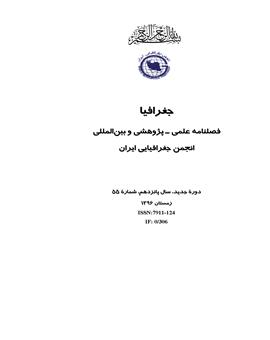تبیین مدیریت شهری کارآمد با ارائه الگوی توسعه حرفهای مدیران (مورد مطالعه: شهرداری تهران)
محورهای موضوعی :
1 -
کلید واژه: الگو توسعه پایدار شهری توسعه حرفهای مدیران شهرداری تهران,
چکیده مقاله :
برای تحقق مدیریت شهری کارآمد باید دیدگاه و رویکرد سیستمی و کلینگر به عوامل مدیریت شهری و برقراری ارتباط نظامیافته به عوامل توسعه شهری داشت که یکی از این عوامل خود مدیران سازمانهای خدمات شهری هستند. توسعه حرفهای مدیران، اقدامی است که عملکرد مدیریت را از طریق افزایش دانش یا مهارتهای مدیر و با تغییر نگرش وی، بهبود میبخشد. در این راستا، پژوهش حاضر با استفاده از رویکرد پژوهش کیفی، به مطالعه عوامل مؤثر بر توسعه حرفهای مدیران شهرداری تهران پرداخته است تا با توسعه مدیران شهری زمینه توسعه پایدار شهری نیز فراهم شود. به همین منظور با 23 نفر از مدیران عالی و ارشد شهرداری تهران، مصاحبههای عمیق بهعمل آمد. برای تحلیل دادههای حاصل از مصاحبهها، از تحلیل تفسیری استفاده شد. روایی یافتههای پژوهش از طریق بررسی توسط اعضا (مصاحبهشوندگان) تأیید گردید و برای محاسبه قابلیت اطمینان یا سازگاری کدگذاریهای انجامشده، از روش پایایی بازآزمون و روش پایایی توافق بین دو کدگذار (توافق درون موضوعی) استفاده شد. نتایج حاصل از تحلیل مصاحبهها نشان داد که توسعه حرفهای مدیران، شامل توسعه در دو بُعد فردی و سازمانی میباشد. در بُعد توسعه فردی، سه سطح توسعه ویژگیهای روانشناختی، توسعه دانش تخصصی و مدیریتی و توسعه اخلاقی مطرح میشود. در بُعد توسعه سازمانی، توسعه ویژگیهای ساختاری و فرایندی سازمان باید صورت گیرد. در حوزه توسعه ویژگیهای روانشناختی عواملی چون تفکر انتقادی، خلاقیت، هوش هیجانی، ریسکپذیری و خودتوسعهای مدیران باید توسعه یابند. در حوزه دانش تخصصی و مدیریتی، نیازهای توسعه حرفهای مدیران شهرداری، شامل تواناییهای استفاده از تکنولوژی، تسلط بر اصول تصمیمگیری و حل مسئله، مدیریت استرس، توانایی تیمسازی، مدیریت تعارضات سازمانی، توانایی ارتباطات اثربخش و اصول و فنون مذاکره است. برای توسعه حرفهای مدیران، توسعه ساختاری سازمانی اعم از توجه به مدیریت استعداد، حمایت سازمانی، مدیریت عملکرد، سازمان یادگیرنده، جو سازمانی، کارراهه شغلی و شبکهسازی و در حوزه توسعه فرایندهای آموزشی سازمان، عواملی چون مربیگری، یادگیری عملی، جانشینپروری و یادگیری سازمانی باید مدنظر قرار گیرند و توسعه یابند.
In order to realize efficient urban management, systemic and comprehensive approach should be applied to urban management and systematic communication to urban development factors. One of these factors is the managers of the municipal services themselves. Professional development of managers is an action that improves managerial performance by improving manager's knowledge or skills and changing his/her attitude. In this regard, the present study uses a qualitative research approach to study the factors affecting the professional development of Tehran municipality managers in order to provide sustainable urban development with the development of urban managers. For this purpose, deep interviews were conducted with 23 top officials and senior managers of Tehran municipality. Interpretative analysis was used to analyze data from interviews. The validity of the research findings was verified by the members (interviewees). To determine the reliability or compatibility of the coding, the retest reliability method and the agreement method between the two coders (intra-subject agreement) were used. The results of interviews showed that professional development of managers includes development in both individual and organizational dimensions. In the dimension of individual development, there are three levels of development of psychological characteristics, the development of specialized knowledge and management and moral development. In the area of organizational development, the development of structural and organizational features must take place. In the area of development of psychological characteristics, factors such as critical thinking, creativity, emotional intelligence, risk taking and self-development of managers must be developed. In the field of professional and managerial knowledge, the needs of professional development of municipal managers include the ability to use technology, mastery of decision making principles and problem solving, stress management, team building capabilities, management of organizational conflicts, the ability to communicate effectively, and the principles and techniques of negotiation. For professional development of managers, organizational structural development including attention to talent management, organizational support, performance management, learner organization, organizational climate, career path and networking and in the area of developing educational processes of the organization, such as coaching, practical learning, successor and organizational learning should be considered and developed.
